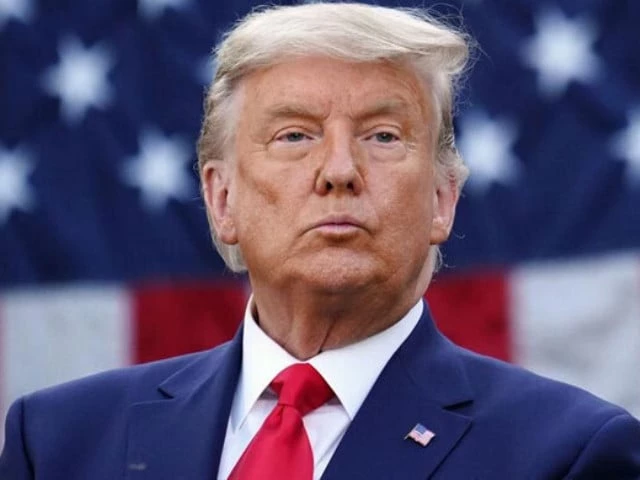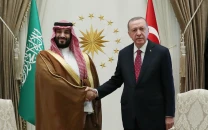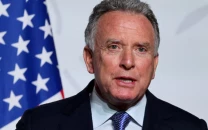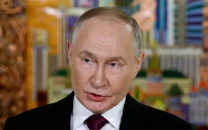Trump says Europe losing freedom of speech, backs VP Vance’s Munich address
Vance’s speech on free speech and immigration in Europe draws criticism from German officials and EU leaders.

US President Donald Trump said on Friday that Europe is “losing” its freedom of speech and praised Vice President JD Vance’s remarks at the Munich Security Conference, calling them “a very brilliant speech.”
Speaking to reporters in the Oval Office, Trump said Vance’s address was well received and highlighted what he sees as a growing problem in Europe.
“I heard his speech, and he talked about freedom of speech. And I think it’s true in Europe, it’s losing, and they are losing their wonderful right of freedom of speech,” Trump said.
The president also linked immigration to crime in Europe, echoing Vance’s concerns about migration policies.
“He talked about immigration. And Europe has a big immigration problem, just take a look at what’s happened with crime, take a look at what’s happening in various parts of Europe,” he said.
Vance’s criticism sparks backlash
Vance’s speech at the Munich Security Conference earlier on Friday sharply criticised European governments, accusing them of suppressing free speech and failing to control immigration.
“I believe that dismissing people, dismissing their concerns or, worse yet, shutting down media, shutting down elections or shutting people out of the political process protects nothing,” Vance said.
His remarks drew swift criticism from European leaders, including German Defence Minister Boris Pistorius, who condemned the speech as “unacceptable.”
“I must respond to the speech we heard earlier from the US vice president,” Pistorius said. “While European democrats take a firm stance against right-wing extremism, they remain fully committed to basic rights and freedoms.”
Vance also suggested that concerns over Germany’s upcoming federal elections and the rise of the far-right Alternative for Germany (AfD) party were overblown.
“Trust me, I say this with all humor, if American democracy can survive 10 years of Greta Thunberg scolding, you guys can survive a few months of Elon Musk,” he said, referring to Musk’s recent vocal support for AfD.
Musk, a major donor to Trump’s 2024 campaign, has drawn criticism for publicly backing AfD leaders and livestreaming a conversation with party co-chair Alice Weidel.
Divisions over security and Ukraine
Vance’s speech underscored growing divisions between the Trump administration and European leaders on key issues, including defence spending and Ukraine.
While the conference had been expected to focus on the Ukraine war following Trump’s recent call with Russian President Vladimir Putin, Vance largely avoided the topic. Instead, he urged Europe to take greater responsibility for its own security.
“In the future, we think Europe is going to have to take a bigger role in its own security,” Vance said in a meeting with German President Frank-Walter Steinmeier.
NATO Secretary General Mark Rutte agreed, saying, “We have to grow up in that sense and spend much more.”
German Foreign Minister Annalena Baerbock, however, warned against any peace deal being imposed on Ukraine.
“A sham peace – over the heads of Ukrainians and Europeans – would gain nothing,” she said.
Russia currently controls about 20% of Ukraine, nearly three years after launching a full-scale invasion. Moscow claims it acted to prevent Ukraine from joining NATO, while Kyiv and its allies view it as an unprovoked attack.
Vance met with Ukrainian President Volodymyr Zelenskiy on the sidelines of the conference, though both declined to give details of their discussion.
Far-right connections raise concerns
Vance’s meeting with AfD leader Weidel in Munich has sparked further controversy, with critics calling it an endorsement of the far-right ahead of Germany’s February 23 elections.
The AfD, which is polling around 20%, is under scrutiny from German security agencies over alleged extremist ties. The party’s rise has raised concerns about the future direction of German politics.
Vance’s spokesman, William Martin, later downplayed the meeting, saying the vice president was engaging with a range of political figures in Munich.
The rift between the Trump administration and European allies appears to be widening, with security, democracy, and migration policies at the centre of the divide.

1724219889-0/BeFunky-collage]_____-(32)1724219889-0-100x90.webp)





















COMMENTS
Comments are moderated and generally will be posted if they are on-topic and not abusive.
For more information, please see our Comments FAQ